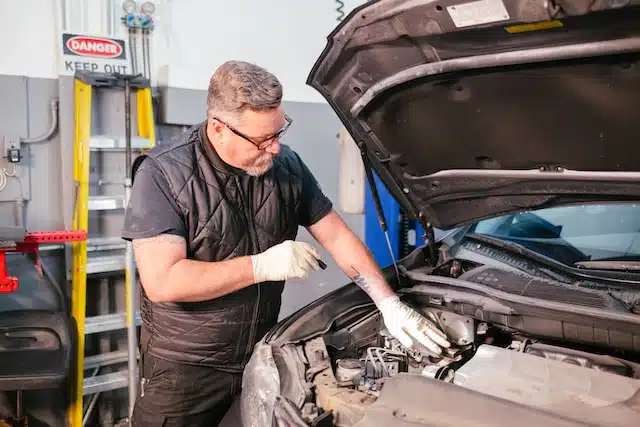
If you’ve ever wondered, “Why does my car shake when I’m driving?“, this article is designed to provide answers. The unsettling experience of a shaking car can result from numerous underlying issues, including wheel misalignment, worn or damaged tires, brake problems, faulty suspension system, engine-related problems, or even issues with the steering column, power steering, or transmission fluid. This guide dives into each of these potential causes, explains how they contribute to the shaking sensation, and suggests practical solutions. By understanding and addressing these issues, you can restore your car’s smooth performance, enhance its longevity, and most importantly, ensure your safety on the road. So, buckle up as we navigate the bumpy journey of a shaking car and pave the way towards smoother drives.
Vehicle Vibration Analysis: Diagnosing Car Shaking When Driving
| Problem Category | Possible Causes | Potential Solutions | Diagnostic Signs |
|---|---|---|---|
| Tires and Wheels | Unbalanced tires, misaligned wheels, damaged tires or wheels | Wheel balancing, alignment service, tire or wheel replacement | Vibration in steering wheel, uneven tire wear, vehicle pulls to one side |
| Brakes | Warped rotors, worn brake pads, caliper issues | Rotor resurfacing or replacement, brake pad replacement, caliper service | Shaking when braking, squealing noises, reduced braking power |
| Suspension System | Worn out shock absorbers, struts, ball joints, or control arms | Shock absorber, strut, ball joint, or control arm replacement | Bouncing ride, uneven tire wear, poor handling |
| Engine and Transmission | Engine misfires, transmission issues, faulty engine mounts | Engine tune-up, transmission repair, engine mount replacement | Rough idling, acceleration issues, unusual engine movement |
| Steering System | Loose steering components, power steering malfunctions | Steering component repair or replacement, power steering service | Loose steering feel, whining noise when steering, fluid leaks |
Understanding the Reasons behind Car Shaking
A variety of factors can cause your car to shake while driving. Some of the most common include misalignment of wheels, problems with brakes, issues with the suspension system, damaged or worn-out tires, and engine-related problems. Let’s take a closer look at each of these causes.
Car Is Shaking When Driving: Explanation of Each Cause

Misalignment of Wheels
When your car’s wheels are not aligned correctly, it can cause the car to shake or vibrate. Misalignment may occur due to hitting a pothole, curb, or as a result of normal wear and tear.
Misalignment can be caused by a variety of factors, including worn suspension parts, impacts with potholes or curbs, or simply from normal wear and tear. When your wheels are not properly aligned, they aren’t working together in harmony, which can cause your vehicle to vibrate or shake.
Damaged or Worn-Out Tires
Tires are crucial for the vehicle’s performance and safety. They are in direct contact with the road and any issues can lead to uneven handling or vibrations. Common problems include:
Uneven Wear
Uneven wear can occur due to misalignment, improper inflation, or failure to rotate the tires. When the tread wears unevenly across the tire, it can cause your car to shake.
Unbalanced Tires
If a tire is unbalanced, it will spin unevenly and can cause vibrations that become more noticeable with increased vehicle speed.
Damaged Tires
Damage such as bulges, blisters, or punctures can also cause a tire to be out of balance and create vibrations. Damaged tires should be replaced as soon as possible to prevent a blowout.
Problems with Brakes
If your car shakes when you apply the brakes, the issue possibly lies within the braking system. Warped rotors, worn brake pads, or other brake-related problems can cause your car to shake, especially when the brakes are applied. Warped rotors can happen due to excessive heat generated from heavy braking or braking over long distances. Worn brake pads can cause metal-on-metal contact, leading to vibrations.
Issues with Suspension System
The suspension system in your car is designed to provide a smooth ride by absorbing the irregularities of the road surface. However, if components of the system are worn out or damaged, they could cause your car to shake. Components of the suspension system, such as the shock absorbers, struts, control arms, and bushings, can wear out or become damaged over time. This can lead to instability while driving, causing your car to shake or vibrate.
The suspension system also helps maintain correct tire contact with the road, which is crucial for proper steering and braking. If components of the suspension system, such as shock absorbers, struts, or bushings, are worn out or damaged, they may not function correctly, causing the car to shake or vibrate. This can be particularly noticeable when driving over bumps, during turns, or at certain speeds.
Engine-Related Problems
Various engine issues can cause your car to vibrate or shake. These could include problems with spark plugs, fuel intake system, or other engine components. Engine-related problems causing a car to shake or vibrate are often due to misfires or issues with the fuel intake system.
Misfires
Misfires often occur due to worn or faulty spark plugs or spark plug wires. When a misfire occurs, it’s like the engine has missed a step. This causes an imbalance as the engine’s cylinders aren’t firing in proper order, resulting in shaking. Regular maintenance, including spark plug replacement, is essential for preventing misfires.
Fuel Intake System Issues
The fuel intake system could also be a source of engine-related problems. The system needs to maintain an exact balance of air and fuel to work effectively. If any component of this system, such as the air filter, fuel injectors, or intake manifold gasket is faulty, it can disrupt the balance and cause the engine to vibrate.
Motor Mounts
Motor mounts, or engine mounts, are another potential source of engine-related vibrations. These mounts hold the engine in place and absorb its vibrations. If a mount is broken or worn out, those vibrations can be felt inside the car. A mechanic can diagnose and replace faulty motor mounts.
Steering Column Issues
Steering column issues can indeed lead to a car shaking while driving. The steering column is a crucial link between the steering wheel and the steering mechanism, and it can wear out over time. If there’s excessive play in the bushings or ball joint within the steering column, you may experience vibrations, especially noticeable in the steering wheel while driving. Regular maintenance and checks can help prevent this issue, but if you notice a sudden vibration or a shaky steering wheel, it’s essential to get the steering column checked by a professional immediately.
Power Steering Problems
Power steering problems can also cause a car to shake, particularly during turns. The power steering system uses hydraulic fluid to make steering your car easier. However, if there are leaks or the fluid level drops too low, the system won’t work effectively, leading to shaking or difficulty in steering. This problem is often accompanied by a whining noise when turning the wheel. Regular checks of the power steering fluid and system can help identify and address any issues before they become serious.
Low Transmission Fluid
Low transmission fluid can also cause your car to shake, particularly during acceleration. The transmission fluid’s role is to lubricate moving parts and bearings in the gearbox, and to help create hydraulic pressure where needed. If the fluid levels drop too low, it can cause grinding or resistance in the transmission, leading to shaking or shuddering when you accelerate. Regularly checking the transmission fluid levels, and addressing any leaks promptly, can help maintain the smooth operation of your vehicle.
Car Is Shaking When Driving: Possible Solutions

Regular Wheel Alignment Checks and Adjustments
The solution for wheel misalignment is to have your vehicle’s alignment checked and adjusted by a professional. Most tire shops and auto repair facilities have specialized equipment to measure and correct alignment. Regular wheel alignments can prevent uneven tire wear, improve handling, and stop your car from shaking. Ideally, have your wheels professionally aligned every 5,000 to 10,000 miles.
Brake Maintenance and Replacements
Regularly inspect your brake system and replace any worn-out components. Having your braking system regularly checked is key to preventing these issues. If you notice any shaking when you apply the brakes, it’s important to have your vehicle inspected by a professional as soon as possible. They can replace worn components, machine or replace warped rotors, and ensure your braking system is functioning properly.
Suspension System Checks and Repairs
Routine suspension checks can identify worn or damaged parts before they cause major problems. A professional can conduct a thorough inspection of your suspension system and replace any components that are causing issues. Regular maintenance and replacing parts when necessary can greatly improve ride quality and prevent vibrations.
Regular Tire Inspection and Replacement
Ensure your tires are properly balanced and replace them if they are worn or damaged.
Regular tire rotations and balancing can help prevent uneven wear and vibrations. It’s also important to inspect your tires regularly for any damage such as cuts, punctures, or bulges. If a tire is damaged or worn out, it should be replaced immediately. Furthermore, maintaining proper tire pressure can also help prevent uneven tire wear and extend the life of your tires.
Engine Tune-Ups and Maintenance
Regular tune-ups can greatly improve the performance and lifespan of your engine. This typically includes replacing spark plugs and wires, changing the oil and oil filter, checking and replacing air and fuel filters, and inspecting the timing belt. In addition to preventing vibrations, regular tune-ups can improve fuel efficiency and prevent costly repairs down the line.
Steering Column Issues
Problems with the steering column can cause your car to shake, especially when turning. This could be due to worn bushings or bearings, or other issues within the steering column itself.
If you’re experiencing vibrations or shaking when turning, it’s important to have your steering column inspected by a professional. They can identify the issue and replace any worn or damaged parts, restoring smooth and responsive steering.
Power Steering Problems
Issues with your car’s power steering system can also cause your car to shake, particularly when you’re turning the steering wheel. This could be due to a leak in the power steering fluid, a worn power steering pump, or problems with the power steering belt.
If you notice any problems with your steering, such as vibrations, difficulty turning the wheel, or a whining noise when you turn the steering wheel, it’s important to have your power steering system checked as soon as possible. A professional can identify the issue, whether it’s a fluid leak or a mechanical problem, and fix it to restore your power steering.
Low Transmission Fluid
Low transmission fluid can cause your car to shake or jerk, especially when shifting gears. This is because the transmission fluid lubricates the moving parts within the transmission, reducing friction and allowing for smooth gear changes.
Experiencing shaking, particularly during gear shifts, signals a need to inspect your transmission fluid levels. Should the fluid be low, it’s crucial to refill it to the manufacturer’s recommended level. A dark or dirty appearance of the fluid, on the other hand, might indicate that a change is necessary. In some cases, low transmission fluid could indicate a leak, which should be repaired as soon as possible. Regularly checking and maintaining your transmission fluid can prevent vibrations and keep your transmission running smoothly.
Car Is Shaking When Driving: Specific Concerns
Car Is Shaking When Braking
Your car can shake when you apply the brakes due to several reasons such as worn or unbalanced tires, damaged brake components, uneven rotors, or worn brake shoes. These issues can significantly affect the braking performance and overall safety of your vehicle. Regular maintenance, like tire rotations and balancing, can help prevent these problems. If you notice persistent shaking while braking, it’s crucial to seek professional help to inspect and repair the issue. Understanding how the brake system works is also important as it helps in identifying potential issues. Regular brake system inspections, using high-quality parts, and adhering to the manufacturer’s maintenance schedule are key to maintaining optimal brake performance and preventing car shaking when braking.
Car Is Shaking In Reverse
While some issues causing a car to shake while driving may be similar to those causing it to shake in reverse, there are certain problems that are specifically associated with a car shaking only when it’s in reverse gear. For example, if the shaking occurs predominantly while reversing, this could suggest issues with the transmission or the differential, which are crucial in changing the direction of your car’s movement. Transmission problems might include worn-out transmission mounts or damaged gears. On the other hand, differential issues could be due to worn-out bearings or bad differential fluid. In these scenarios, it’s essential to consult a professional mechanic to accurately diagnose and address the problem, ensuring the vehicle’s safe operation.
Car Shakes At Idle But Smooths Out While Driving
It’s a common but disconcerting scenario: your car shakes at idle but seems to smooth out once you start driving. This condition often indicates an issue with the engine’s performance at low RPMs or when not under load. Faulty spark plugs, clogged fuel injectors, or an uneven idle speed (often due to a malfunctioning idle air control valve) are typical culprits. Similarly, a worn-out motor mount can cause shaking at idle, as it’s no longer effectively isolating the engine’s vibrations from the car’s frame. However, when you accelerate, the engine’s increased speed and load can often mask these issues, creating the illusion of the problem disappearing. Regardless of the cause, it’s important to address this issue promptly to prevent further damage and maintain optimal vehicle performance.
Car Only Shakes At High Speed
Experiencing vibrations or shaking only at high speeds can be quite unnerving for drivers. This specific issue can be attributed to a variety of factors, most commonly related to the wheels, tires, or suspension system of the vehicle. For instance, unbalanced tires can cause a car to shake at certain speeds, usually becoming noticeable at around 50-60 mph and intensifying as you accelerate. Similarly, wheels that are out of alignment can result in high-speed shaking as the misaligned wheels struggle to maintain straight-line travel. Damaged suspension components or a bent driveshaft can also create vibration at high speeds. While these are common causes, they’re not exhaustive, and it’s essential to have a professional diagnose the problem to ensure it’s correctly identified and resolved.
Car Only Shakes At Low Speed
If your car shakes only at low speeds, it could be due to several issues. Often, this is a sign of problems related to the wheels or tires. These could include imbalanced tires, a bent wheel, or even damaged or worn-out components in your vehicle’s suspension or steering systems. A problem with the brake system, such as warped rotors, can also cause vibrations noticeable at lower speeds. Furthermore, issues with the drivetrain, including a failing CV joint or problems with the transmission, can cause shaking at low speeds. These issues could generally be more noticeable at slower speeds and may seem to disappear at higher speeds.
Car Shakes When Accelerating
If your car shakes when accelerating, it could be due to a variety of reasons. Often, this can be a sign of issues within the drivetrain or engine. Problems such as misaligned tires, worn-out CV joints, or a failing transmission can cause this symptom. Other potential causes include engine issues such as spark plug failure, fuel injector problems, or air intake issues. The issue might also be related to the suspension or steering system, including problems with the steering rack or worn-out struts. Determining the exact cause can require a professional diagnostic test, as these issues can range from minor inconveniences to more serious problems that may affect the safety and performance of the vehicle.
Why Does My Car Only Shake When Accelerating?
When a car shakes only during acceleration, it often points to problems that are directly related to the drivetrain, which is the system responsible for delivering power from the engine to the wheels. This could be a sign of issues such as worn out or unbalanced tires, faulty CV joints or universal joints, or a problem with the transmission. Engine-related issues like a misfiring cylinder, faulty spark plugs, or fuel delivery problems can also cause shaking during acceleration. Additionally, it could indicate a problem with the vehicle’s suspension system. Since these issues are most noticeable when the vehicle’s engine is under load – which happens during acceleration – they might not be apparent when the vehicle is idling or decelerating.
Car Is Shaking While Stopped
If your car is shaking while stopped, it’s typically indicative of engine-related issues. This could be due to a problem with the engine mounts, which are designed to secure the engine to the car’s chassis while absorbing vibrations. When these mounts wear out or break, you may feel more engine vibrations, particularly when the car is not in motion. Another common cause is a misfire in one of the engine’s cylinders, which can happen due to worn spark plugs, fuel injector problems, or issues with the air intake system. An uneven idle, which might be the result of a vacuum leak or a dirty or malfunctioning idle air control valve, can also cause the car to shake while it’s stopped.
Car Is Shaking When Driving: Preventive Measures
Maintaining a regular car maintenance schedule is vital to prevent issues like a shaking car. This should include routine checks on your wheels, brakes, suspension, tires, and engine. Any unusual behavior from your car should be addressed immediately to prevent further complications.
In conclusion, while having your “car shaking when driving” can be disconcerting, understanding the potential causes and appropriate solutions can help you address the issue effectively. Regular maintenance and immediate response to unusual car behavior are essential to ensuring your car’s optimal performance and your safety on the road.
Car Is Shaking When Driving: Frequently Asked Questions

Q: Why is my car shaking when I drive?
A: There could be several reasons why your car is shaking when you drive. Among these, tires are a common culprit – they may be unbalanced, worn out, or damaged, causing uneven contact with the road and resulting in vibrations. Wheel alignment can also play a significant role; if the wheels are not properly aligned, they may pull against each other and generate shaking. A problematic brake system, such as worn-out brake pads or warped rotors, might also cause the car to shake, especially when you apply the brakes. Engine-related problems, such as misfiring spark plugs or issues with the fuel intake system, can cause your car to vibrate, as can problems with the suspension system, such as worn-out struts or shocks.
Q: Can worn-out tires cause my car to shake?
A: Yes, worn-out, unbalanced, or damaged tires can cause your car to shake. The uneven surface of the tire can cause it to bounce or wobble as it rotates, sending vibrations through the vehicle.
Q: What engine-related problems could cause my car to vibrate?
A: Engine-related problems causing a car to vibrate often come down to misfires or issues with the fuel intake system. These could be due to worn or faulty spark plugs, a malfunctioning fuel intake system, or broken motor mounts.
Q: How can I fix the shaking in my car?
A: The solution depends on the cause of the problem. It might involve balancing or replacing your tires, realigning your wheels, servicing your brakes, repairing or tuning up your engine, or fixing your suspension system. Always consult with a professional mechanic for a proper diagnosis and solution.
Q: Why is my car shaking and the check engine light on or flashing?
Typically, if your car is shaking and the check engine light is on or flashing, it’s likely that you’re dealing with an engine misfire. The check engine light is designed to illuminate whenever there’s an issue that could potentially increase vehicle tailpipe emissions.
An engine misfire is one such problem that almost always results in increased hydrocarbon emissions, hence triggering the check engine light. A misfire takes place when there’s incomplete (or zero) combustion occurring inside one of the engine’s cylinders. If a misfire is severe enough, you may notice the engine beginning to shake.
It’s crucial to understand that an engine requires three primary ingredients to run properly: a precise air-fuel mixture, adequate spark, and good compression. If any of these elements are lacking or inadequate, incomplete combustion occurs, leading to a misfire. This is why your car might be shaking while the check engine light is on.
Misfires can stem from a broad range of issues. Common causes include problems with the ignition system, such as a defective coil pack or worn spark plugs, or complications with the air-fuel mixture, like a vacuum leak or malfunctioning fuel injectors. Engine mechanical issues can also lead to misfires, for instance, when there’s a failing lifter or a timing chain that has jumped. Sensor-related problems, including a faulty mass airflow sensor or crankshaft sensor, can disrupt normal engine function. Wiring difficulties, such as a fractured wire or loose connector, are also potential culprits. Additionally, issues with emissions equipment, like a malfunctioning exhaust gas recirculation valve or a secondary air injection system failure, can cause misfires. Lastly, computer-related problems, such as outdated software or faulty hardware, can lead to similar issues. Each of these problems can potentially result in a misfire, causing noticeable shaking and triggering the check engine light.
Q: Could a problem with the steering column cause my car to shake?
A: Yes, a worn-out or damaged steering column can cause your car to shake. If you notice vibrations in your steering wheel, it’s best to have your steering column checked as soon as possible.
Q: Can low transmission fluid cause my car to shake?
A: Yes, low transmission fluid can cause grinding, which can lead to shaking in the car when you try to accelerate. It’s important to regularly check your transmission fluid levels and top up as necessary.
Q: Why does my car shake when I brake?
A: If your car shakes when you brake, it could be due to an issue with your braking system. This might be because of warped rotors, worn brake pads, or other brake-related problems. It’s best to have your brakes checked by a professional mechanic to ensure they are working correctly.
Q: Could a problem with my car’s suspension system cause it to shake?
A: Yes, a problem with your car’s suspension system can cause it to shake. This could be due to the system being out of alignment, having loose components, or containing damaged parts. Regular maintenance and inspections can help prevent these issues.
Q: Can a wheel alignment issue cause my car to shake?
A: Yes, if your car’s wheels are not aligned properly, they can cause the vehicle to shake. Misalignment can occur due to normal wear and tear, or from incidents like hitting a pothole or curb.
Q: Can a minor accident or a fender bender cause my car to shake?
Yes, even a minor accident or a fender bender can cause your car to shake. During a collision, even a seemingly minor one, the impact can cause damage to various components of your vehicle, leading to noticeable vibrations. For instance, the impact might result in a bent axle or wheel, a damaged tire, or problems with the alignment. These issues can all cause your car to shake or vibrate. In addition, the impact could cause damage to the suspension system, engine mounts, or steering components, which can also lead to noticeable shaking. Even if the exterior damage from the accident seems minor, it’s crucial to have your vehicle inspected by a professional to rule out any internal damage that could impact your car’s performance or safety.
Q: What are the signs of a wheel bearing problem that could cause my car to shake?
A: A worn or damaged wheel bearing can cause a wheel to start moving irregularly, which leads to vibrations while driving. Signs of a wheel bearing problem include a rumbling noise coming from the wheel area and increased shaking or vibrations as you speed up.
Q: Can a problem with my car’s power steering cause it to shake?
A: Yes, issues with your car’s power steering system can cause the vehicle to vibrate, especially during turns. This could be due to low power steering fluid, a faulty power steering pump, or a damaged steering rack.
Q: How often should I have my car’s suspension system inspected to prevent shaking?
A: It’s recommended to have your car’s suspension system inspected at least once a year, or every 12,000 miles, whichever comes first. However, if you notice any issues such as shaking, it’s best to have it checked immediately.
Q: Can a bent axle or driveshaft cause my car to shake?
A: Yes, a bent axle or driveshaft can cause vibrations in your car. These issues can result from accidents or rough driving, and typically cause shaking at specific speeds.
Q: How can I prevent my car from shaking in the future?
A: Regular maintenance is key to preventing your car from shaking. This includes regularly checking and rotating your tires, maintaining proper wheel alignment, keeping your brake system in good condition, and servicing your engine as recommended by the manufacturer.
Q: Can a faulty spark plug cause my car to shake?
A: Yes, worn out or faulty spark plugs can disrupt the engine’s normal firing sequence, leading to misfires and consequently causing your car to shake. Regularly servicing your vehicle and replacing spark plugs as recommended can help avoid this issue.
Q: Can a faulty transmission cause my car to shake while driving?
A: Yes, a faulty transmission or low transmission fluid can indeed cause your car to shake. The transmission is responsible for transferring power from the engine to your wheels, and any issues with it can lead to noticeable vibrations. This is usually more noticeable during gear changes or when accelerating.
Q: How much does it typically cost to fix a car that’s shaking?
A: The cost to fix a shaking car can greatly vary as it depends on the root cause of the problem. Minor issues such as tire balancing or alignment may cost anywhere from $50 to $100, while more significant repairs like replacing worn-out brake pads or addressing engine problems can range from a few hundred to several thousand dollars. It’s important to get a diagnosis from a trusted mechanic to understand the scope of the issue.
Q: Is it safe to drive my car home if it starts shaking on the road?
A: While a shaking car might not immediately leave you stranded, it’s generally not advisable to continue driving. The shaking could be a symptom of a serious issue that could lead to more extensive damage if not addressed promptly. It’s recommended to pull over safely and call for roadside assistance.
Q: Can a simple tire rotation stop my car from shaking?
A: In some cases, yes. If the shaking is caused by uneven tire wear, a tire rotation could help even out the wear patterns and reduce the shaking. However, if the shaking persists after a tire rotation, it’s likely due to a different issue and should be inspected by a professional.
Q: Why is my car steering wheel shaking?
If your car’s steering wheel is shaking, it is usually related to issues with the wheels, tires, or brakes. One of the most common causes is unbalanced tires. When tires aren’t balanced properly, they can cause the steering wheel to shake, and this is often more noticeable at certain speeds. Another possible reason is a misalignment of the wheels, which can also cause the steering wheel to vibrate. Issues with the brake system, such as warped brake rotors or worn-out brake pads, can cause the steering wheel to shake, especially when braking. Less commonly, problems with the suspension or steering system, like a worn-out tie rod or failing power steering pump, can also lead to shaking in the steering wheel. If you’re noticing this symptom, it’s crucial to have it diagnosed and repaired, as it can affect your vehicle’s handling and safety.
Q: Can regular car maintenance prevent my car from shaking in the future?
A: Regular maintenance can significantly reduce the likelihood of your car developing issues that lead to shaking. Routine check-ups, wheel alignments, tire rotations, and engine tune-ups can help identify potential problems early on and keep your vehicle running smoothly.


